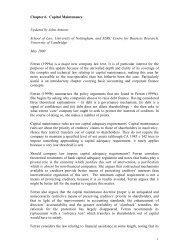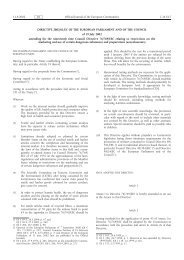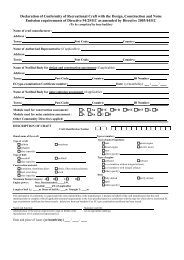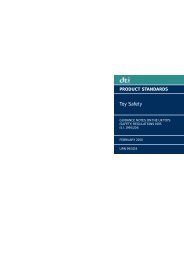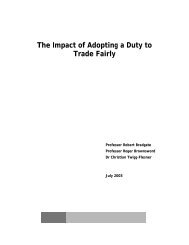From Exuberant Youth to Sustainable Maturity - DTI Home
From Exuberant Youth to Sustainable Maturity - DTI Home
From Exuberant Youth to Sustainable Maturity - DTI Home
You also want an ePaper? Increase the reach of your titles
YUMPU automatically turns print PDFs into web optimized ePapers that Google loves.
A key threat is new development talent from<br />
emerging markets. Nurturing relationships with<br />
publishers and reinforcing the value of the quality,<br />
reliability and creativity of the UK's development<br />
community can combat this.<br />
The following chart lists all the major strengths,<br />
weaknesses, opportunities and threats (SWOT)<br />
facing the UK development sec<strong>to</strong>r. These are<br />
discussed in greater detail in Appendix A, Detailed<br />
subsec<strong>to</strong>r overviews.<br />
Exhibit 34: Development SWOT<br />
Strengths<br />
• Strong, well respected development<br />
talent<br />
• Proximity <strong>to</strong> US and European culture<br />
• Strong local market<br />
• UK often European HQ for international<br />
publishers<br />
• Strong trade body - TIGA<br />
Opportunities<br />
• Growing installed base, of increasing<br />
diversity<br />
• Better awareness and use of<br />
Government support<br />
• Option <strong>to</strong> move up the value chain<br />
(in<strong>to</strong> publishing)<br />
• Better use of middleware<br />
• E-commerce and new platforms<br />
Weaknesses<br />
• Low understanding and profile of games<br />
industry<br />
• Limited access <strong>to</strong> finance<br />
• Limited appeal/narrow focus of titles<br />
• Skills - both new talent, and business<br />
skills<br />
• Limited home market (c.f. US and<br />
Japan)<br />
Threats<br />
• Undercutting - growth of cheap<br />
development talent in emerging markets<br />
• High barriers <strong>to</strong> growth leading <strong>to</strong> lower<br />
competition, innovation and skills<br />
• Foreign acquisition of key development<br />
talent<br />
Source: Spectrum analysis; Spectrum games industry interviews<br />
3.4.2 UK Publishing SWOT<br />
The strength of the UK publishing sec<strong>to</strong>r lies in the<br />
quality and creativity of its products. It is made up of<br />
one established international player, Eidos, and a<br />
series of well regarded publishers, such as<br />
Codemasters, Rage and SCi, who simply do not<br />
have the global reach or the size of portfolio <strong>to</strong><br />
compete with the larger international players. The<br />
possibilities for these companies <strong>to</strong> grow on an<br />
international scale are limited without strong support<br />
from the UK financial community. These<br />
relationships have <strong>to</strong> be improved through a process<br />
of information and communication. Without<br />
significant growth, UK publishers can survive, but are<br />
in a risky position.<br />
There are many opportunities for publishers including<br />
maximising the value of their IP, boosting their<br />
portfolios with low risk third party developed and<br />
funded products, adding value and revenue from<br />
products through e-commerce and targeting sales<br />
activity at other new retail outlets such as<br />
supermarkets.<br />
The following chart lists all the major strengths,<br />
weaknesses, opportunities and threats (SWOT)<br />
facing the UK publishing sec<strong>to</strong>r. These are discussed<br />
in greater detail in Appendix A, Detailed subsec<strong>to</strong>r<br />
overviews.<br />
Exhibit 35: Publishing SWOT<br />
Strengths<br />
• Strong local development<br />
• English language<br />
• Some valuable IP<br />
• Strong local market<br />
• Strong trade body - ELSPA<br />
Opportunities<br />
• Growing installed base, of increasing<br />
diversity<br />
• Console marketing battle<br />
• New retail outlets<br />
• Cheap development talent in emerging<br />
markets<br />
• E-commerce<br />
3.5 Key challenges<br />
In interviews and workshops with industry<br />
participants, the issues identified in the table below<br />
were cited as the key challenges facing the UK<br />
games industry. They are presented here in order of<br />
perceived importance with brief supporting issues,<br />
which are further explored in more detail in the bulk<br />
of this section.<br />
Exhibit 36: Key issues - summary<br />
UK COMPETITIVENESS SUMMARY<br />
Weaknesses<br />
• Limited access <strong>to</strong> finance<br />
• Limited skills base - project and<br />
business management etc.<br />
• Lack of global presence<br />
• Small scale (staff / turnover / cash)<br />
• Strength of retailers<br />
Source: Spectrum analysis; Spectrum games industry interviews<br />
Issue Details<br />
Profile/reputation<br />
Access <strong>to</strong> finance<br />
Industry data availability<br />
Skills development<br />
Model of IP ownership<br />
Threats<br />
• High barriers <strong>to</strong> entry / growth<br />
• Scale of competi<strong>to</strong>rs<br />
• Not close <strong>to</strong> origination of major<br />
licenses (most US)<br />
• Acquisition by other publishers<br />
• Reliance on console titles makes more<br />
vulnerable<br />
• Size and value of industry <strong>to</strong> UK not widely appreciated /<br />
unders<strong>to</strong>od<br />
• Perception of industry as 'not a proper job<br />
• Poor national media coverage and perception of games -<br />
'violent, 'antisocial', 'waste of time'<br />
• UK financial community limited understanding of nature of<br />
games industry<br />
• Limited options for exit routes for inves<strong>to</strong>rs<br />
• His<strong>to</strong>rical disappointments by games companies on the financial<br />
markets<br />
• UK games industry's limited appreciation of values of financial<br />
industry<br />
• Predicting global nature of market<br />
• Choosing platforms<br />
• Adapting <strong>to</strong> mass-market developments of the market<br />
• Lack of comprehensive global market and consumer data<br />
• Lack of communication (and trust) within the industry<br />
• Limited mobility in experienced labour force<br />
• Need for formal routes in<strong>to</strong> the industry - education for new<br />
talent<br />
• Lack of business and management skills<br />
• Lack of in-house training<br />
• Fear of loss of UK talent <strong>to</strong> other countries<br />
• Acquisition, creation, retention and protection of IP<br />
• Full exploitation of IP<br />
Source: Spectrum analysis; Spectrum games industry interviews<br />
Competitiveness analysis of the UK games software sec<strong>to</strong>r Main report 23






